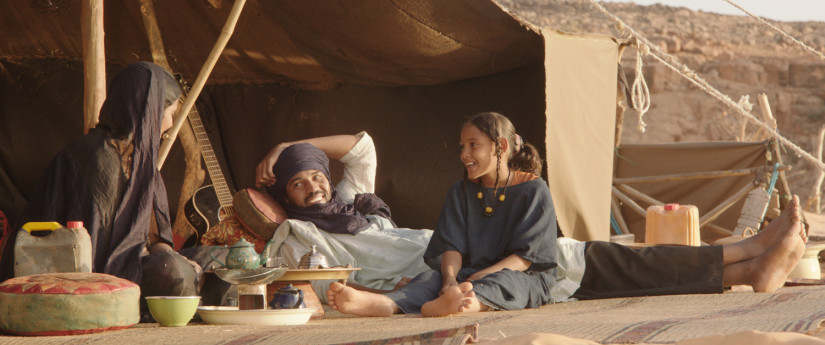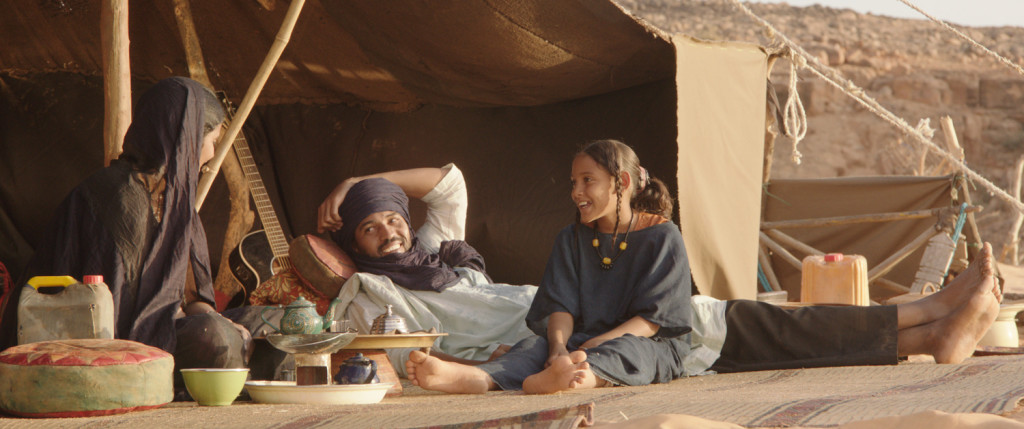With the flurry of historically-based films dominating the cinematic landscape it is difficult to find one that does not rely on overwrought drama or huge stars to push it to success. Yet with Timbuktu, the long-awaited new film from Mauritanian director Abderrahmane Sissako, we have an equally touching and beautifully filmed story about injustice and the life-changing choices people are forced to make when their world suddenly changes for the worst.
Sissako returns to Mali for his first feature film since 2006’s Bamako, which also serves as the director’s best-known film. In northern Mali lies the city of Timbuktu, known in antiquity as a flourishing land of commercial trading and intellectual advancement. But while those glorious days are long gone, what still stands is a multicultural city inhabited by many open and tolerant ethnicities. But a few years ago Timbuktu, and a huge part of Northern Mali, were taken hostage for an entire year by foreign gun-toting religious jihadists who chose to twist traditional Muslim teachings with their own version of sharia law.
With a multiethnic ensemble that reflects the variety of people in the city (there are six different languages spoken throughout the film), the focus lies on Kidane (Ibrahim Ahmed), a laid-back cattle herder living in the Timbuktu dunes with his wife Satima (Toulou Kiki) and their daughter Toya (Layla Walet Mohamed, talented beyond her youth), who are his entire world. Kidane believes that unlike the people in town, who are not allowed to play music, smoke cigarettes, play soccer, or even laugh too loudly or else face inane punishments, their peaceful existence will not be too affected by the occupiers. But a fatal encounter with the fisherman who murdered his favorite cow changes the family’s destiny, and Kidane must now face the savage new laws of the fundamentalists.

With Timbuktu, Sissako has revisited his main themes of displacement, exile, and globalization, crafting situations to show how his characters are able to resist or submit. A memorable scene in which a young woman (Fatoumata Diawara) is severely punished for singing would play clichéd in another director’s hands. But Sissako, who in past films like Bamako and Waiting for Happiness (2002) is able to convey the power behind unorthodox means of resistance, makes it compelling. There is nothing clichéd about this film as even the jihadist soldiers are not stereotypical foot soldiers carrying out orders, but caring men with a strict mission to accomplish. And despite the atrocities, the love between Kidane and Satima and their daughter Toya signifies a hope that love can survive this misery.

While cinematographer Sofian El Fani (Blue is the Warmest Color, 2013), should be lauded for his patience at helping to guide the imagery, as should longtime Sissako editor Nadia Ben Rachid, Timbuktu is not so much an art film as it is a personality based one within a wide landscape. Actor Abel Jafri also stands out as Abdelkharim, the often aloof jihadist determined to make Satima his, yet not cartoonish in his aggressiveness. Dance and choreographer Kettly Noël also stands out as the town madwoman/witchdoctor whom the jihadists refuse to enforce their laws upon for fear of retribution.
Loosely based on true events, Mauritania’s first ever official selection for the Academy Award for Best Foreign Language Film 2015 has already won the Prize of the Ecumenical Jury and the François Chalais Prize at this year’s Cannes Film Festival.
Timbuktu opens on January 28, 2015 in New York at Lincoln Plaza Cinema & Film Forum and January 30th in Los Angeles. Click here for more theater listings throughout February.
Directed by Abderrahmane Sissako
Written by Abderrahmane Sissako and Kessen Tall
Cast: Ibrahim Ahmed, Toulou Kiki, Layla Walet Mohamad, Abel Jafri, Hichem Yacoubi, Fatoumata Diawara, Kettly Noël
Genre: Drama
Country: Mauritania/France
Language: Arabic, Bambara, French, English, Songhay, and Tamasheq with English subtitles
Runtime: 97 min.
Official Website: http://cohenmedia.net/films/timbuktu


